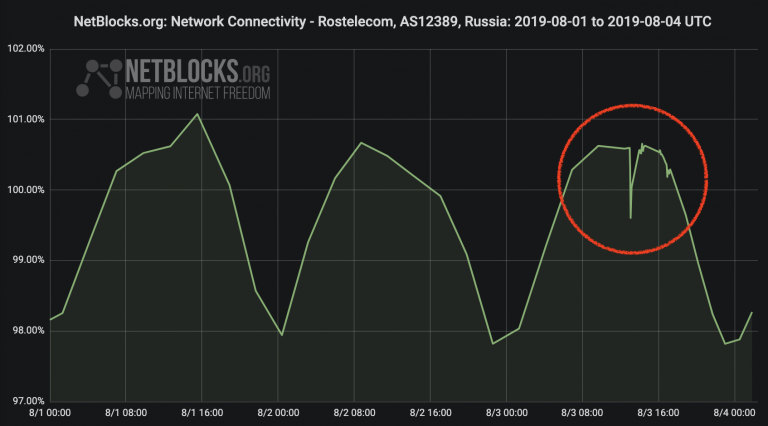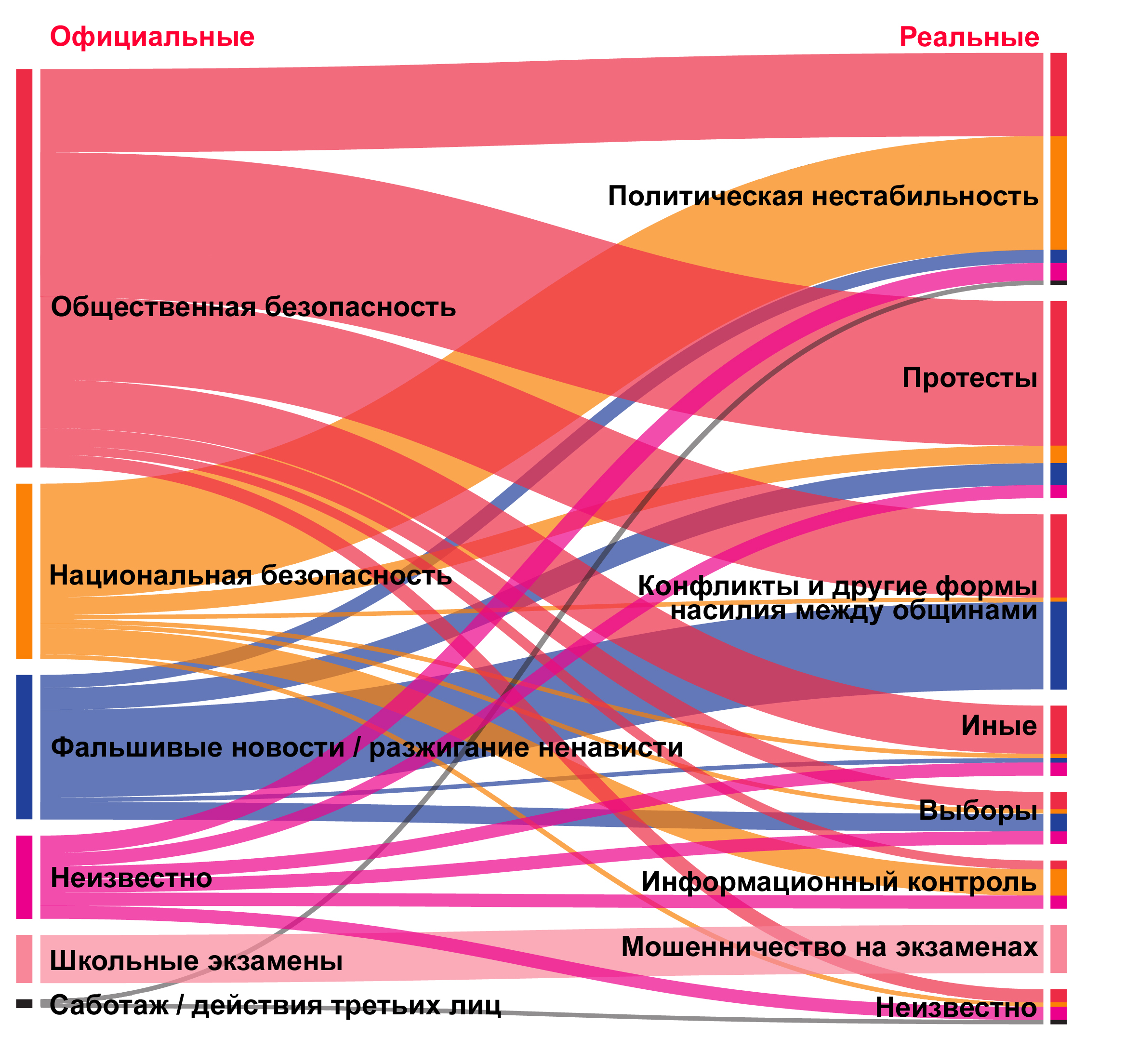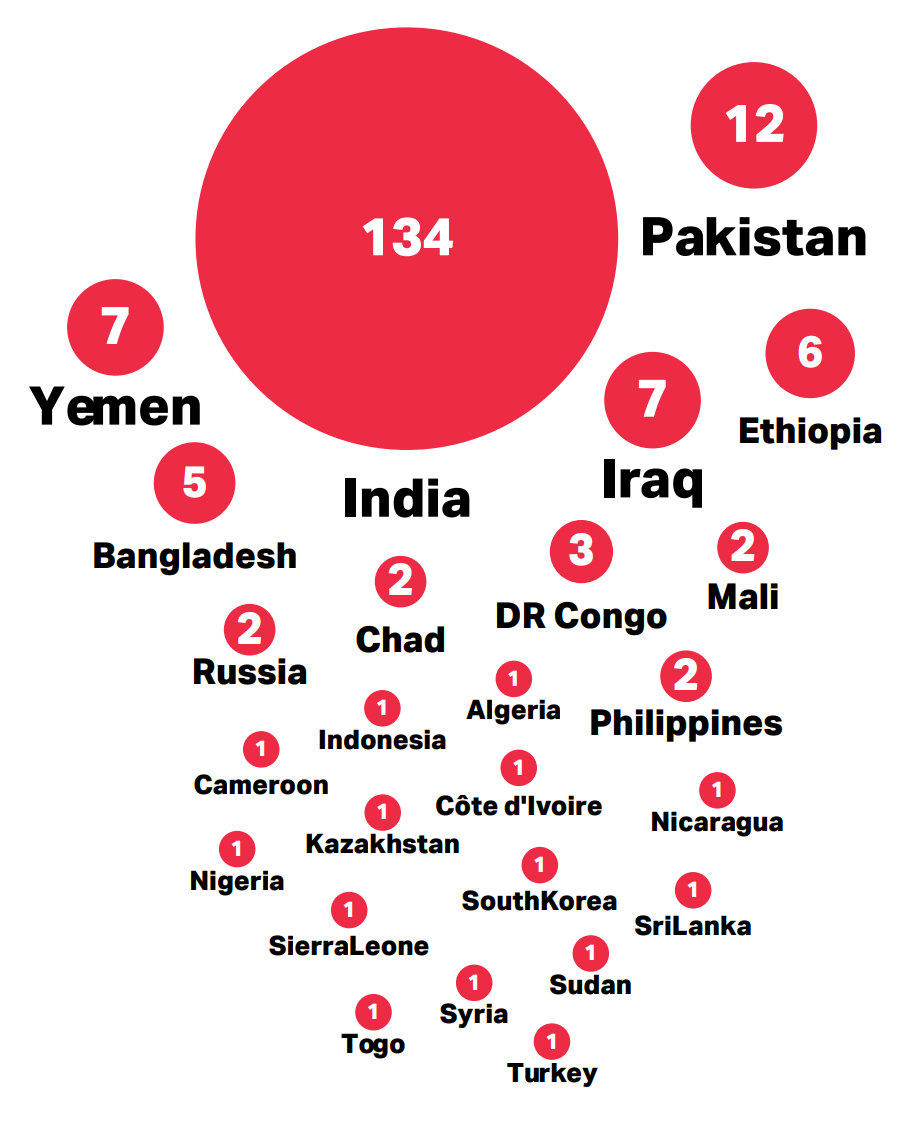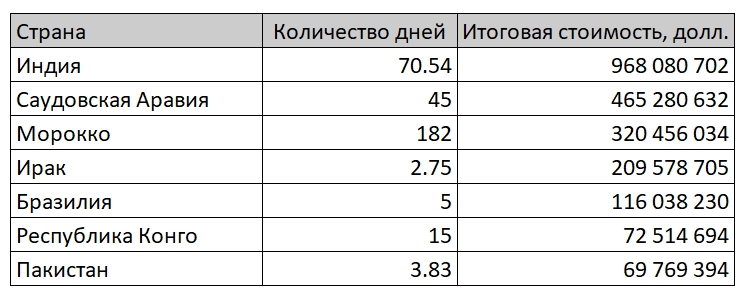
On August 3, in Moscow between 12:00 and 14:30, the Rostelecom AS12389 network experienced a small but noticeable subsidence. NetBlocks
considers the incident the first in the history of Moscow "state shutdown." This term refers to the disconnection or restriction of access to the Internet by the authorities.
What happened in Moscow for the first time has been a global trend for several years. Over the past three years, 377 targeted Internet outages have been reported by authorities around the world, according to
Access Now .
States are increasingly using restrictions on access to the Internet, both as a tool for censorship and as a tool in the fight against unlawful acts.
But the question is, how effective is this tool? What are the results of its use? Recently, several studies have appeared that shed some light on this issue.
There are two main ways to turn off the Internet that are most commonly used:
The first is the disruption of the functioning of the entire network, as was
recently the case in Mauritania .
The second is blocking access to certain websites (for example, to social networks) or messengers, ”as it was
recently in Liberia .

The world's first major episode of disconnecting the Internet occurred in 2011, when the Egyptian government disconnected the Internet and mobile networks for five days during the “
Arab Spring ”.
But only in 2016, the governments of some African countries began to actively use regular outages. The first outage ball was played by the Republic of the Congo, which blocked all telecommunications for a week during the presidential election.
It is important to understand that outages are not always political censorship.
Algeria, Iraq, and Uganda temporarily turned off the Internet while conducting exams at school to prevent leakage of exam questions. In Brazil, a
court blocked WhatsApp in 2015 and 2016 after Facebook Inc (owned by WhatsApp) did not satisfy court requests for data in a criminal investigation.
In addition, it is certainly true that hate speech and fake news can spread very quickly on social networks and instant messengers. One way to prevent the spread of such information that is used by authorities is to restrict access to the network.
Last year, for example, the flow of
lynching in India was triggered by rumors spread through WhatsApp, resulting in a staggering 46 killings.
However,
Access Now’s Digital Rights Group believes that the dissemination of false information often only serves as a screen for temporary outages. For example, a
study of Internet outages in Syria showed that they tend to coincide with significantly higher levels of violence by government forces.
 Official VS real reasons for disconnecting the Internet in 2018 according to Access Now
Official VS real reasons for disconnecting the Internet in 2018 according to Access Now .
Outage geography
In 2018,
Access Now recorded 196 Internet outages worldwide. As in previous years, the majority of outages were in India, 67% of all registered in the world.
The remaining 33% in different countries: Algeria, Bangladesh, Cameroon, Chad, Cote d'Ivoire, Democratic Republic of the Congo, Ethiopia, Indonesia, Iraq, Kazakhstan, Mali, Nicaragua, Nigeria, Pakistan, the Philippines and Russia.

Impact of outages
An interesting study was published in February 2019, its author Jan Rydzak from Stanford University has been researching Internet blackouts and their effects for about 5 years.
Jan Rydzak studied India, where there were more Internet outages than anywhere else in the world. The reasons for many of them were not explained, but those that were officially recognized were usually explained by the need to suppress a variety of violent collective actions.
In total, Rydzak analyzed 22,891 protests in India between 2016 and 2017. His research shows that both restrictions on access to the Internet and social networks do not seem to lead to a decrease in the level of escalation.
In cases where protests were related to violence, he found that Internet outages were usually associated with his escalation. Each subsequent day after turning off the Internet led to more violence than when the action took place with constant access to the Internet.
Meanwhile, during the disconnection of the Internet in peaceful events, which are probably more dependent on careful coordination through digital channels, no statistically significant effect of outages was revealed.
In addition, the data obtained indicate that in some cases, disconnecting access to the network led to the replacement of non-violent tactics with violent tactics, which apparently are less dependent on effective communication and coordination.
Outages
Despite the fact that disabling internet access is becoming an increasingly popular measure for many governments, one should not forget that this is not a free pleasure.
Examining the impact of 81 short-term restrictions on Internet access in 19 countries from July 2015 to June 2016, Darrell West of the Brookings Institution found that the total loss of GDP is estimated at $ 2.4 billion.
 List of countries with the maximum loss from Internet disconnection.
List of countries with the maximum loss from Internet disconnection.It is important to note that Darrell West considered only the economic impact of outages on
gross domestic product . He did not assess losses from lost tax revenues, the impact on labor productivity, or the loss of investor confidence resulting from blackouts.
Thus, the $ 2.4 billion figure is a conservative estimate that is likely to underestimate real economic damage.
Conclusion
The question certainly needs further study. For example, the answer to the question of how much research of shutdowns in India can be projected onto any other countries is at least not obvious.
But at the same time, it seems that disabling the Internet is at best a poorly working tool with a high cost of use. The use of which can lead to negative consequences.
And other risks are possible, for example, restrictions of international organizations or courts, worsening of the investment climate. The probability of occurrence of which has not yet been studied.
And if so, then why?